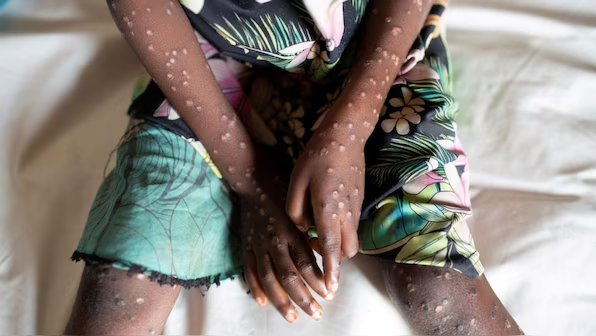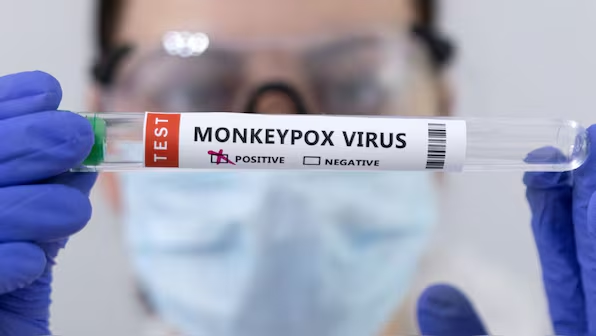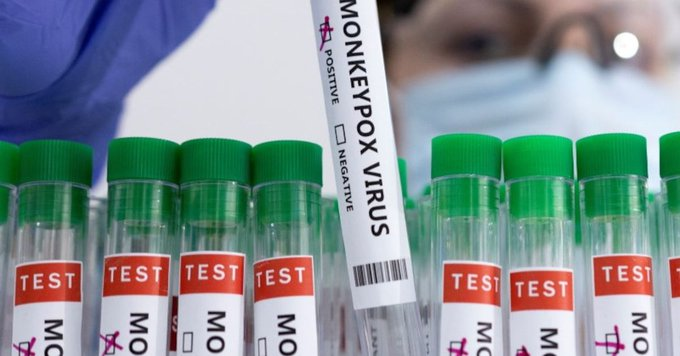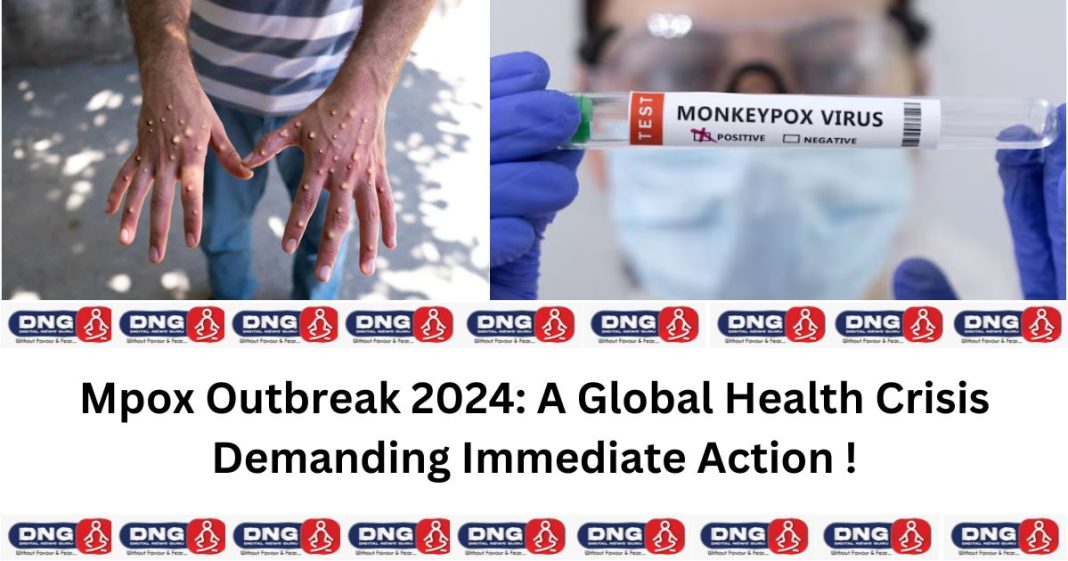DIGITAL NEWS GURU HEALTH DESK :-
Mpox Outbreak 2024: A Global Health Crisis Demanding Immediate Action !

The recent surge in mpox cases has been declared a “Public Health Emergency of International Concern” (PHEIC) by the World Health Organization (WHO). This designation is critical as it signals the severity of the outbreak and the need for a coordinated global response.
The outbreak is particularly concerning due to its rapid spread in Africa, especially in the Democratic Republic of the Congo (DRC) and neighboring countries that have not previously reported cases.
What is Mpox?

Mpox, formerly known as monkeypox, is a viral disease caused by the monkeypox virus, a member of the Orthopoxvirus genus, which also includes the variola virus responsible for smallpox. While mpox is less deadly than smallpox, it can still cause significant morbidity and mortality, especially among vulnerable populations such as children and immunocompromised individuals.
First identified in humans in 1970 in the Democratic Republic of the Congo (DRC), mpox is endemic to Central and West African countries. The disease typically presents with symptoms similar to smallpox, though less severe, including fever, headaches, muscle aches, and a distinctive rash that often progresses to pustules and scabs.
The disease spreads through close contact with infected individuals, animals, or contaminated materials, and more recently, it has been observed to spread via sexual transmission.
The 2024 Outbreak:

The current outbreak of mpox is particularly concerning due to several factors. Firstly, a new variant, known as Clade 1b, has emerged, which is proving to be more virulent than previous strains. T
his clade has been associated with higher mortality rates and more severe symptoms, particularly among children. In the DRC alone, over 15,600 cases and more than 500 deaths have been reported this year, with a significant number of these cases occurring in children under 18.
What makes this outbreak even more alarming is its rapid spread beyond traditional endemic areas. Cases have been reported in countries that have never before encountered mpox, including Burundi, Kenya, Rwanda, and Uganda.
This sudden geographic expansion suggests that the virus is evolving or finding new modes of transmission that are enabling it to spread more easily across borders.
Why is it an ‘Emergency of International Concern’?

The WHO’s declaration of a PHEIC is not made lightly. This status is reserved for events that pose a significant risk to public health across countries and require a coordinated international response. The current mpox outbreak meets these criteria for several reasons.
Firstly, the rapid spread of the virus across multiple countries highlights the potential for the outbreak to become a global health crisis. The emergence of Clade 1b, which is more deadly and transmissible, increases the risk that the virus could spread to regions where health systems are unprepared to deal with it.
This is particularly concerning given the weaknesses in surveillance and healthcare infrastructure in many of the affected regions, which have likely led to significant underreporting of cases.
Secondly, the outbreak is occurring against a backdrop of limited resources and vaccines. Although two vaccines are currently recommended by the WHO for mpox, the supply is vastly insufficient to meet the current demand. The WHO has initiated an Emergency Use Listing to expedite vaccine access, but the need far outstrips what is currently available.
This shortage is particularly acute in Africa, where the outbreak is most severe. The high cost of the vaccine and the logistical challenges of distribution further complicate efforts to control the outbreak.
Thirdly, there is a risk that the virus could continue to mutate, potentially leading to even more virulent strains. The experience with COVID-19 has shown how quickly a virus can evolve, and the potential for new variants of mpox to emerge is a serious concern. This possibility underscores the need for ongoing research and surveillance to track the virus’s evolution and adapt public health responses accordingly.
The Global Response:

The WHO’s declaration is a call to action for the international community. It underscores the need for immediate and sustained efforts to control the outbreak, including increased funding for surveillance, vaccination, and treatment efforts.
The WHO has already released $1.45 million from its Contingency Fund for Emergencies to support initial response activities, but much more will be needed to bring the outbreak under control.
In addition to financial support, there is a need for greater international cooperation in sharing data, resources, and expertise. The lessons learned from the COVID-19 pandemic must be applied to ensure that countries are better prepared to respond to emerging infectious diseases like mpox.
Conclusion:

The 2024 mpox outbreak is a stark reminder of the ongoing threat posed by infectious diseases, particularly in regions with weak healthcare infrastructure. The WHO’s declaration of a PHEIC is a critical step in mobilizing the global response needed to control the outbreak and prevent further spread.
However, it will require a concerted effort from the international community, including governments, non-governmental organizations, and the private sector, to provide the resources and support needed to combat this growing threat. Without swift and coordinated action, the mpox outbreak could have devastating consequences for global public health.
YOU MAY ALSO READ :- Saif ali khan birthday special : नवाबी खानदान से संबंध रखते है सैफ, पद्मश्री अवार्ड से भी हो चुके है सम्मनित !








